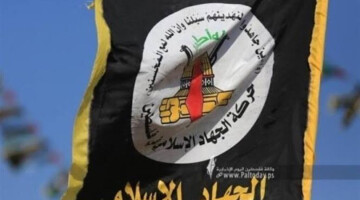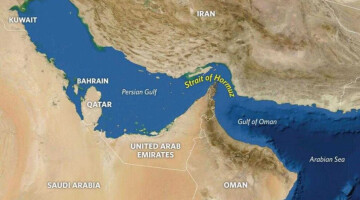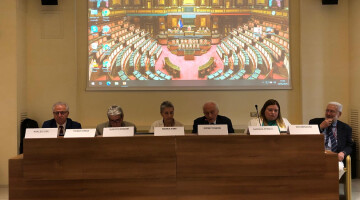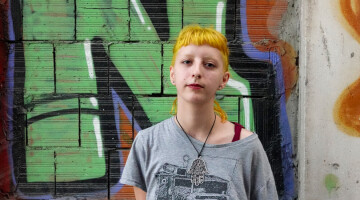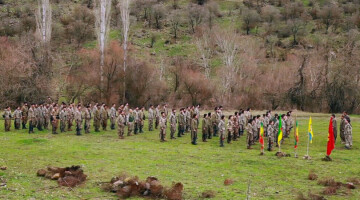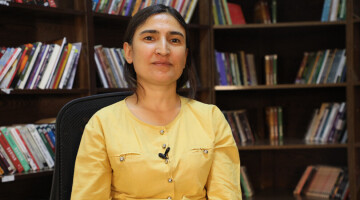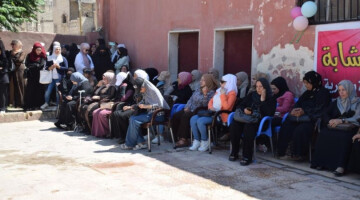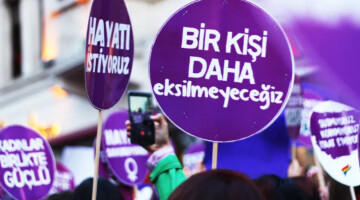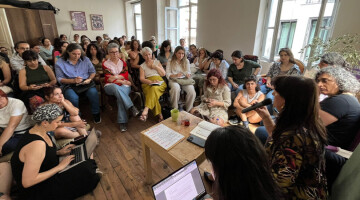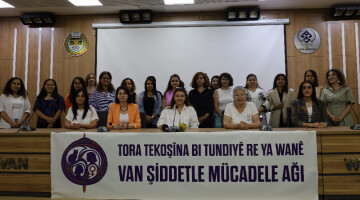We are on journey from Qamishlo to Derik with the two Êzidî women that were rescued from ISIS during Raqqa Operation. The driver of the car belonging to an institution affiliated with the Democratic Autonomous Administration tells me that the two Êzidî women were rescued from ISIS. The women are headed to the Newroz Camp in Derik in order to reach Shengal Women’s Assembly. I change my plans in order to go to the camp with these two women. We chat along the way. Neither of them thinks that there is any hope left for them. They say that the YPG rescued them.
The paths of H.N. and S.H., who were captured by ISIS when the gangs attacked Shengal, crossed when YPG forces rescued them during Raqqa operation. Their pain and experiences are similar.
H.N. has 7 children and is 35 years old. S.H. is only 19 years old. H.N. holds her head high when she speaks, and says “This is not our shame, those that did this to us should be ashamed.” S.H. is shy and ashamed, and has difficulty talking about her experience. As N.H. shares her experience, she tells S.H to “tell her story so everyone hears it, revenge is taken from the dogs that did this to us, and other women get rescued.”
‘ISIS HAS HER 3 CHILDREN AND HUSBAND’
ISIS has kept 3 of H.N.’s 7 children as prisoner since the day of the massacre, when H.N. was captured by the gangs as she tried to leave Shengal. H.N. describes her experience in the following way:
“Everybody escaped when ISIS attacked. We tried to flee with our car but they stopped us at the checkpoint. They separated men from women. In the evening, they took us to Tal Afar. They put women and children in a house. They separated older boys from the women and put us in Banush Prison. We stayed there for 8 days. Later, warplanes hit the prison and they took us to Tal Afar where they placed us in a school. They said that we were not worth anything and took us to Shia village. They picked young girls for themselves and took my daughter away from me. They were taking young girls to Syria and selling them there. Later, they took us to Mosul and separated us from older women, whom they kept in Iraq because they thought they would not be useful. They sent young girls and women to Syria and sent me and my children there too. In Syria, they took two of my sons away from me.”
‘WE WERE SOLD AS SLAVES’
H.N. stated that they had a more difficult time in Syria where their children were sold as slaves in markets several times. H.N. noted that they lived in fear and pain, remarking that the gangs beat her and children as they said ‘you are all infidels.’ H.N. Told that: “They took us to a place in Syria and later to Raqqa. After we stayed in an underground prison in Raqqa for a while, they took us to Tetmur and later to somewhere else. They took our clothes off and made us walk in a square full of ISIS gangs. They read our names including mine and sold me to a guy there. I stayed with him for two months. He was Syrian. Then, there was a problem between that man and his superiors. He gave me to a Sudanese. That man took me and my children to Bab. We later went to Raqqa. Later, I found out that my daughter had been sold to a guy. They had already taken my son away from me in Tetmur. They took my other son later in Raqqa.”
‘THEY MAKE OUR BOYS JIHADIS’
H.N. stated that Êzidî boys were taken from their mothers at a young age to be trained as jihadis that will attack their own people, while Êzidî girls were taken to be sold in markets as soon as they had their first periods. H.N. said that boys were trained to be monsters and girls were sold to ISIS gangs. H.N. remarked that she and other enslaved women were taken to the houses of ISIS members’ families, where the gangs’ wives beat them and their children.
‘I GOT BRAVE WHEN I FOUND OUT THAT THE YPG WAS NEAR’
H.N. told that she escaped from the man that bought her as a slave and reached YPG forces. She describes her escape in the following way: “I heard about the Raqqa operation when the guy that bought me was speaking to another ISIS member. They said that YPG was close and there was movement in the city. Some people were leaving the city. One night, my children and I wore niqabs and mixed in with the population when we left the house. We reached where the comrades were. If they had not fought against ISIS, we would not have gotten out of there. I did not have much courage before, but I got brave when I found out that the YPG was near. Our lives were worse than death.”
‘THEY CANNOT HOLD THEIR TEARS AT THE CAMP’
Despite H.N.’s efforts, S.H. is unable to share her story and her sentences are left unfinished. As she chats in the car, she also takes care of her children. When we reach Newroz Camp, it was already dark. Camp officials greet us when our car stops at the camp. Everyone welcomes the two women with compassion. They take us to warm place because of the cold weather. Camp dwellers that are curious about their relatives who are still held by ISIS or that want to celebrate the two women begin to visit us.
Firstly, the mothers in white dresses that are part of the Newroz Camp Women’s Assembly visit the two women. H.N., who has not shed a single tear on the road as she told me her story, and S.H. breaks into tears as the mothers hug and console them. Later, the women begin to chat about ISIS’ attack on Shengal and the experience of captive Êzidîs. They all express their anger at the KDP for abandoning them and enabling ISIS to capture them.
S.H. SHARES HER EXPERIENCE
The conversation gets deeper with the arrival of Zehra, who is a member of the Shengal Constituent Assembly and the Êzidxan Free Women’s Movement. S.H. now begins to share her experience as other women join in the conversation.
S.H. says that she and her father fell captive to ISIS gangs and were told to follow them until they are taken to their new houses. S.H. States: “I was separated from my father there and I was taken to Mosul, where I reunited with my father for only 10 days. I was then taken to a place in Syria and later to Deir ez-Zor, where I was sold to a gang member. I was sold to different men across Syria and eventually arrived in Aleppo, where I was sold to someone from Raqqa who took me to Raqqa. I was constantly beaten in addition to being sold as a slave, and I was sold to 5 different people in total. There were many young girls like me. Life had no meaning for us. I escaped and reached the YPG.”
All the women in the room feel the same pain and express their anger with deep breaths. One of the mothers say “we are a people that does not want anything bad for anyone. They will pay for what they did to us one day. ISIS dogs and the KDP that abandoned us to ISIS will be destroyed because of what they did to us.”
Zehra says that YJŞ has been established and Êzidî women now have the strength to defend themselves as they reached a certain level of mobilization. S.H. says that YPG and YPJ fighters told her that Êzidî women began to fight ISIS gangs themselves.
As hours pass, more visitors come and I leave the two women. Next day, like all Êzidî women rescued from ISIS, H.N. and S.H. as well as their children are handed over to Shengal Women’s Assembly and sent to Shengal.


